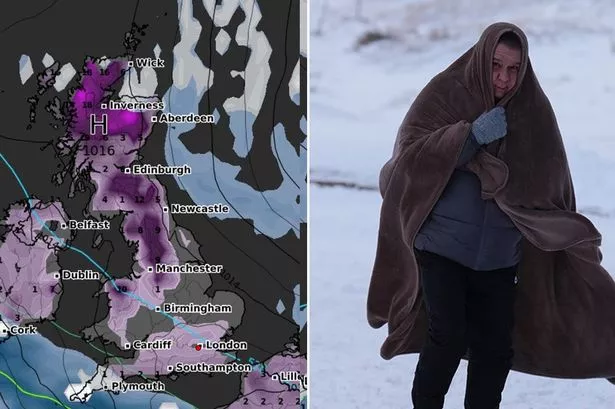The United Kingdom is bracing for an exceptionally frigid January night, projected to be the coldest in 15 years, with temperatures potentially plummeting to a bone-chilling -16°C. This Arctic blast, sweeping across the nation, is expected to bring heavy snow and sleet, creating treacherous conditions and disrupting daily life. The Met Office has issued severe weather warnings, urging residents to take precautions against the extreme cold and potential travel disruptions. This deep freeze is a stark departure from the relatively mild winter experienced thus far and marks a significant shift in weather patterns.
This unprecedented cold snap is attributed to a confluence of meteorological factors. A high-pressure system over Scandinavia is drawing in frigid Arctic air, while a low-pressure system over the Atlantic is feeding moisture into the cold air mass, resulting in widespread snow and sleet. This combination of intense cold and precipitation creates a particularly hazardous situation, increasing the risk of hypothermia, frostbite, and traffic accidents. The prolonged duration of the cold spell further exacerbates the risks, putting strain on infrastructure and demanding increased vigilance from individuals.
The impending extreme weather has prompted widespread concern and preparations across various sectors. Transportation networks are anticipating significant disruptions, with potential delays and cancellations of flights, trains, and buses. Road travel is expected to be particularly hazardous due to icy conditions, and authorities are advising against non-essential journeys. Schools and businesses may also face closures, impacting daily routines and economic activities. Healthcare services are on high alert, preparing for a surge in cold-related illnesses and injuries.
Individuals are urged to take proactive measures to protect themselves and their properties from the extreme cold. Key recommendations include dressing in warm layers, including hats, gloves, and scarves, minimizing exposure to the elements, and ensuring adequate heating in homes. Checking on vulnerable individuals, such as the elderly and those with pre-existing health conditions, is also crucial during this period. Preparing for potential power outages and stocking up on essential supplies, like food and medication, is also advisable.
The agricultural sector is also facing significant challenges due to the freezing temperatures. Farmers are taking measures to protect livestock and crops from the harsh conditions. Concerns are rising about potential crop damage and livestock losses, which could impact food production and prices. The extreme cold can also affect water pipes, leading to bursts and disruptions in water supply. Homeowners are advised to take precautions to insulate pipes and keep them from freezing.
Looking ahead, while the immediate forecast predicts a持續的 deep freeze for the coming days, longer-term projections suggest a gradual moderation in temperatures as the Arctic air mass moves eastward. However, the potential for further wintry weather remains, and vigilance is crucial. The impact of this extreme cold event will likely be felt across various sectors, highlighting the importance of preparedness and resilience in the face of increasingly volatile weather patterns. This event underscores the need for continued investment in weather forecasting and preparedness strategies to mitigate the impacts of such extreme weather events in the future.














